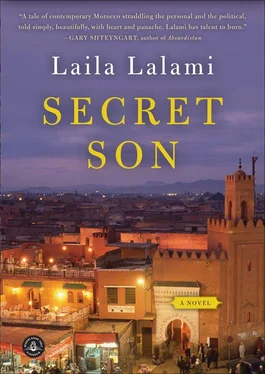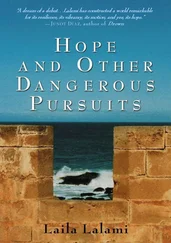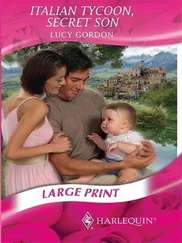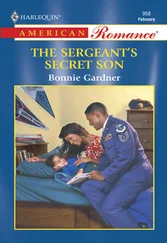It was an occasion that might not arise again, so Youssef couldn’t resist bragging. For once, for just this once, it would not be a lie. “My father,” he said with a half smile.
He waved good-bye to the other students, followed the driver out to the curb, and let him open the door. Youssef slid onto the leather seat next to his father, who put his hand on his shoulder, in a gesture that was halfway between a warm embrace and a friendly pat on the back.
“What are you doing here?”
“I came to see you. You said you studied here.”
“I do.”
Nabil glanced out the window. “It didn’t look like you were doing much studying,” he said. “Let’s go, Omar.” The driver started the engine, easing the car out of the parking space and onto the main street.
“What do you mean?”
“Aren’t classes in session right now?”
“Did you come here just to check on my schedule?”
“No, of course not. I was just teasing you. I thought you had a good sense of humor.”
“Glad to see I amuse you.”
Nabil seemed taken aback. He looked straight ahead of him, at the prayer beads that hung from the rearview mirror. “Would you like to go for a ride?” he asked. “I want to show you something.”
“Okay,” Youssef said, sitting back. The radio was set to Medi 1, the air-conditioning was on, the leather seats were comfortable, but his palms were clammy and he could not stop the nervous tapping of his foot. He looked out at the university buildings as they passed by. So this was what it was like, being driven home from school instead of having to take two buses and then walk another half a kilometer on the red-dust road that led to Hay An Najat. Nabil was humming along to the overture of “Bent Bladi,” and when Abdessadeq Cheqara began singing, he sang along. He seemed to know all the lyrics, including the complicated lines Youssef could never remember.
The driver turned onto a quiet side street and parked in front of an eight-story apartment building with a white facade and windows made of mahogany-colored wood. The doorman got up when the car stopped in front, and did not sit back down until Nabil and Youssef had entered the elevator. They got off on the tenth floor and went into apartment 27. “Come in, come in,” Nabil said.
Youssef took a quick glance at the horseshoe-shaped mirror at the entrance. He was in a white T-shirt, while his father wore a polo shirt with an appliquéd lion’s head, the insignia of the Royal Golf Dar Es Salam. “What’s this?” he asked.
“It’s my apartment,” his father said with a smile. “And now it’s yours.”
“What do you mean?”
“You said you lived in …”
“And?”
“And …” Nabil opened his arms as if they could take in the entire apartment. “Wouldn’t you rather live here? Take a look around before you say anything.” He took out his pack of cigarettes and went to the dining room balcony to smoke.
Youssef stood in the large, sunny living room, with its painted wood ceiling, marble floors, and overstuffed sofas. A breeze blew through the white gauze curtains on the open window. He walked through the corridor to the first bedroom. There was a comfortable-looking bed, a vanity, a mirrored wardrobe, and an oil painting of a Qasbah at sunset. The second bedroom was almost identical to the first, as though the decorator had suddenly run out of inspiration. The only difference was that the painting was of a felucca on the Bou Regreg at sunset. Youssef went to the balcony that gave out onto the park and took in the view. Back in the living room, he noticed a big stack of DVDs on the entertainment center. Wall Street, Apocalypse Now —movies he had seen, but there were also many others he had not seen, like The Battle of Algiers . In the kitchen, he found dishes in the cabinets but almost no food in the refrigerator.
Nabil’s voice came from behind, startling Youssef. “I don’t spend that much time here,” he said. “I come occasionally, when I want to get away from the office or when I don’t have time to go home.” His voice had the hollowness of an empty box. “So what do you think?”
“I can’t live here,” Youssef said. He assumed that this was what he was supposed to say; he had to show some pride and turn down the offer. But of course he could live here; he would love it. He felt suddenly ashamed of his mother’s house, and he tried to think of something else, lest his expression betray his temptation.
Nabil pried one key out of his set. “You don’t have to make up your mind right now,” he said. “Just take a key.”
“But why?”
“Because you’re my son.”
Though Youssef had fantasized about this acknowledgment for a long while, he was unprepared for the way the words were spoken — so calmly, so matter-of-factly — and for what they could mean. His resistance melted when Nabil embraced him. His eyes pricked him, but he held back the tears because he did not want to appear emotional in front of his father, a stranger he had yet to know.

On only a few occasions in the past had Youssef been reluctant to go home to the tin-roofed house he shared with his mother. When he was thirteen, he had mashed pods of mkhinza under the teacher’s desk so that the class had to be canceled because of the smell. He had been suspended and told to bring his mother in to see the principal. Then there was the time when he had been caught, with Maati and Amin, sneaking into the Star Cinema. The volunteer usher had dragged him by the shirt all the way home to confront his mother.
But neither time compared to how he felt tonight. When he walked through the door, he found her bent over a large piece of red fabric, cutting it in half. “Look at this,” she said. “I bought it for fifteen dirhams a meter. Can you believe it?” She smiled; her eyes sparkled with happiness at the bargain she had managed for herself. “Are you hungry? There’s still some harsha left.”
“No, I’m not.” He sat down on the divan next to her, watching as she worked on the fabric laid out on the table.
“I’m going to make a tablecloth out of it. Maybe even napkins.”
“Great.”
“What’s wrong?”
She always knew when he was hiding something, even when she could not get it out of him. Unable to meet her gaze, he looked down at his shoes. “I need to talk to you,” he said. The words came out uneasily, strung together by guilt and regret.
When he looked up again, his mother had dropped the fabric and the scissors. She was glaring at him as though he had just confessed that he planned to kill someone. She slapped him. “Please,” he said, holding her arm away from him. “Don’t hit me.”
“Why?” she screamed. “What do you think you’re going to get out of him?”
“Didn’t you hear what I just said?” Youssef took out the shiny apartment key and showed it to her. “He’s already given us an apartment. We can move out. We don’t have to live here anymore.”
His mother let herself fall on the divan now, her head between her hands, tears running down her face. “My God, my God.”
“What’s wrong?”
“You don’t know who you’re dealing with,” she said, shaking her head.
“Then why don’t you tell me?”
“These people — they’d never do anything for you. They didn’t want you when you were a baby. And now you think it’s going to change?”
“What people are you talking about? My father—”
At the word, his mother blinked.
“My father gave me the apartment,” Youssef said. “Look at the key, right here. It’s ours. We can go there tomorrow and I’ll show it to you if you don’t believe me.”
Читать дальше













